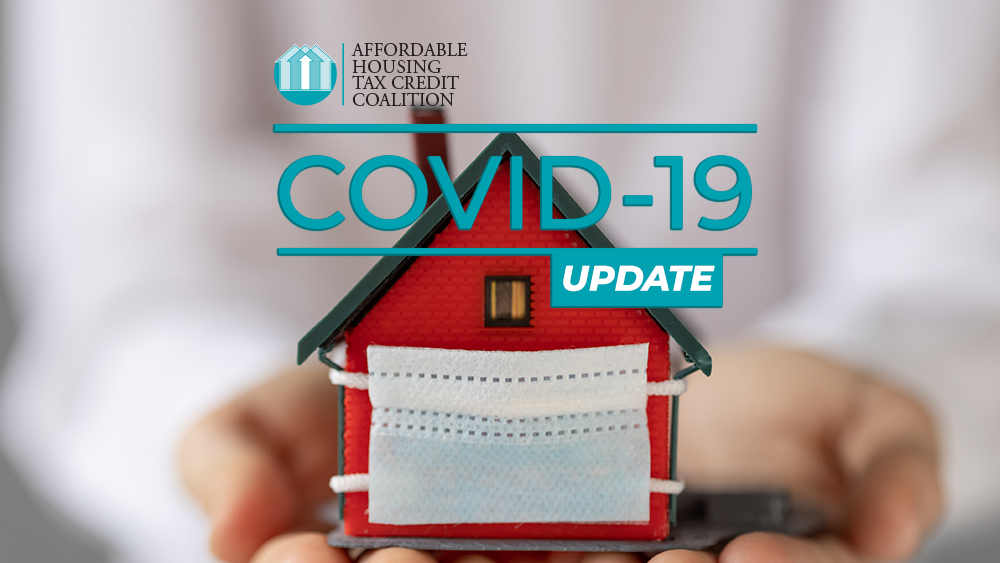The Internal Revenue Service (IRS) has released guidance, effective today, that provides regulatory relief for the Housing Credit, which will address many of the obstacles to building and preserving affordable housing that have arisen as a result of the COVID-19 crisis, at a time when affordable housing is needed more than ever.
The COVID-19 crisis has caused numerous disruptions to affordable housing development and operations, putting at risk the affordable homes which will be a foundation for our nation’s recovery. The new IRS guidance covers many of the regulatory accommodations requested by the National Council of State Housing Agencies (NCSHA) and supported by AHTCC and our partners, and will provide needed deadline extensions, including 10 percent test and rehabilitation expenditure deadlines, compliance and review moratoriums, and other flexibilities needed in order to take into account other challenges that have emerged, like social distancing policies.
Today the IRS also proposed regulations, effective today, to relax previous compliance monitoring regulations that were due to be implemented in 2021. The previous regulations would have increased the number of units state agencies need to monitor, creating additional burden and negatively impacting the provision of affordable housing. For more information on the new regulations, see the NCSHA blog.
Some accommodations were previously provided due to the Major Disaster Declarations in each state, including a 6-month extension of the 10 percent test deadline and a 12-month extension of the placed in service deadline, both at the discretion of Housing Credit agencies, as well as through IRS Notice 2020-23, which extended certain program deadlines until July 15, 2020. See the NCSHA matrix for more information about previous guidance.
“Prior to the COVID-19 crisis, nearly 11 million renter households were spending more than half of their income on rent, and now millions more are facing economic hardship, compounding the need for affordable housing,” said AHTCC Executive Director Emily Cadik. “These flexibilities will allow us to keep developments moving forward more efficiently so the Housing Credit can continue to provide homes to those in need.”
“We thank the IRS for recognizing the immediate need for greater flexibility on behalf of providers of affordable housing and the low-income families we serve,” said Michael Gaber, President of the AHTCC Board of Directors and Executive Vice President of WNC, Inc. “These are common-sense measures that will have a significant impact as we work to provide homes across the country.”
Summary of the IRS Housing Credit Guidance
Many of the regulatory accommodations requested by NCSHA, the AHTCC and our partners included 12-month extensions of deadlines and, while the IRS did not provide extensions of a full 12 months, it did provide 8-month extensions from April 1, 2020, through December 31, 2020, including for the:
- 10% test deadline for carryover allocations,
- Minimum rehabilitation expenditure deadline,
- Deadline for property restoration for a property that suffers a casualty loss,
- Rehabilitation period allowed under IRS Revenue Procedures 2014-49 and 2014-50 until December 31, 2020, for properties impacted by a Major Disaster that has suffered a casualty loss that would have reduced its qualified basis, and
- Last day of a 12-month transition period for a qualified residential rental project.
The guidance also includes:
- Moratoriums on compliance-monitoring reviews and tenant income recertifications from April 1, 2020, through December 31, 2020,
- Clarification that, if an amenity or common area is temporarily unavailable or closed during some or all of the period from April 1, 2020, to December 31, 2020, in response to the COVID-19 pandemic, it will not result in a reduction of the eligible basis of the building, and
- A provision allowing for the emergency housing of medical personnel and other essential workers.
There were also two items requested by the Housing Credit community, but not included in the guidance:
- A 12-month extension of the placed in service deadline as required in IRC Section 42(h)(1)(E)(i).
- A 12-month extension for all open noncompliance corrective action periods.
Advocating for the IRS Guidance
The AHTCC urged the Administration and lead congressional offices to weigh in with the Treasury Department to issue this guidance, and also joined 220 other organizations in sending a letter to Treasury and IRS in support of these accommodations.
We thank the members of Congress who weighed in to move this guidance forward, including Sen. Maria Cantwell (D-WA), who just yesterday raised the urgency of this guidance in a hearing on the IRS response to the COVID-19 crisis; House Ways and Means Committee Chairman Richard Neal (D-MA) and Rep. Suzan DelBene (D-WA), who sent a joint letter to Treasury Secretary Steven Mnuchin; Senate Finance Committee Ranking Member Ron Wyden (D-OR), who included these flexibilities in his list of affordable housing priorities for the COVID-19 response; Sen. Michael Bennet (D-CO), who also sent a letter to Secretary Mnuchin; and Senate Minority Leader Chuck Schumer (D-NY), House Speaker Nancy Pelosi (D-CA), Sen. Todd Young (R-IN) and Rep. Walorski (R-IN), who also urged for the adoption of these flexibilities.
The AHTCC continues to advocate for critically-needed legislative proposals and national affordable housing priorities that would address other immediate affordable housing development challenges created by the COVID-19 crisis, including a minimum 4 percent Housing Credit rate, and provisions that would bolster the country’s long-term economic recovery by expanding and strengthening the Housing Credit.
See the AHTCC’s press release here.



Comments are closed.